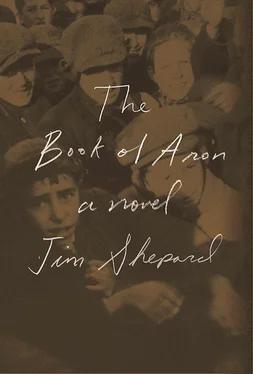HE READ HIS LETTERS ALOUD TO HIMSELF IN THE early morning when he thought everyone else was asleep, so that night I stopped on the stairs and watched from the darkness. I had spent the day mystified by why Boris had acted the way he had.
Korczak held his letter up to the light and read. “To the Editor of the Jewish Gazette: Dear Mr. Editor! Thank you for your favorable evaluation of the Orphanage’s activity. But: ‘Love Plato, yet love more the truth.’ The Orphanage was not, is not, and will never be Korczak’s Orphanage. The man is too small, too weak, too poor, and too dimwitted to gather, feed, warm, protect, and initiate into life almost two hundred children. This great task — this herculean task—”
He stopped and cleared his throat and laid the paper down and made some marks on it. “—has been accomplished through the collective efforts of hundreds of people of goodwill and enlightened minds and insight. As well as by the children themselves.”
He stopped again, still looking at the paper. “Not having any confidence, we are disinclined to promise. Nevertheless, we are assured that an hour of a thinker and a poet’s beautiful fairy tale will provide an experience of the highest order in the scale of feelings. Therefore, we all together invite you—” he said. “We take this occasion to invite you …”
He stood and turned from his writing, then sat down on his bed.
Three weeks of rehearsals were scheduled on the posting board and the performance date was listed as Saturday, July 18. Those who weren’t involved were invited to contribute their opinions when not occupied with chores. The night before everyone got food poisoning and those staff members not throwing up or huddled over chamber pots moved through the darkness with jugs of limewater and morphine for the worst off. Mietek had a nightmare about his mother that was so terrible he shrieked and screamed he was burning up and dying of thirst until Korczak shouted into his face that he would throw him down the stairs and out into the street if he didn’t quiet down.
“That seemed to have worked,” Madame Stefa told him later, while they were soaking up the throw-up with rags.
“Our director shouts and therefore is in command,” he told her.
“He was upsetting everyone,” she said.
“I’m the son of a madman,” he said. “To this day the thought is a torment to me.”
The next morning the main hall looked like a battlefield, but by five that evening the performers had pulled themselves together and gotten into costume.
The audience filled the room and even with the windows open it was so hot that everyone fanned themselves with programs. It smelled of the night before.
Korczak welcomed the guests and told them that an author from India would speak through the mouths of Jewish children in a Polish ghetto. The lights went out and whispers and sounds came from behind the curtain and the kids in the front rows pushed and shoved. The play once it started seemed made for the smaller ones. Abrasha played a sick boy not allowed to leave his room. In the lights his one big eyebrow made him look angry. He had conversations with his doctor and his mother and his stepfather and a watchman on the street and with the mayor and with a fakir and with a flower girl. Then somebody named the Royal Physician came dressed all in white and Abrasha told everyone that he no longer felt any pain and when the boy playing his stepfather asked why they were putting out the lights in his room and opening the curtains and how the starlight would help, Gieńa stepped forward as the flower girl and held out her hands and said, “Be quiet, unbeliever.” And it was as if the entire audience had decided to listen. The kid next to me who’d begun to itch himself stopped.
The physician said Abrasha was asleep and Gieńa asked when he would awake and the physician said as soon as the king came to call him from this world. And she asked if he would whisper a word from her into Abrasha’s ear and when he asked her what he should say she said, before all the lights went out, to tell him she had not forgotten him.
Everyone said they were very moved by the play. An old woman in a Chinaman’s hat told Korczak that he was a genius and could work miracles in a rat hole. He told her that must have been why the others had all been given the palaces.
FOUR DAYS LATER THERE WAS NOISE ON THE STREET early in the morning and in the kitchen Madame Stefa congratulated Korczak on his birthday and handed him a cup of something she’d cooked, and then gave a cry when through the window she saw the lines of blue police and Lithuanians and Ukrainians in black with brown leather collars. Boris had taught me the uniforms. A boy who carried messages from the hospital came in gasping and panting. He said the children there were being evacuated to the Umschlagplatz and apparently getting dumped next to the tracks in their hospital gowns. Korczak got some money from a hiding place behind the stove and ran out the door while the boy was still talking.
I ran after him. Where would I go if he disappeared? I collided with a group running by and a man with a valise knocked me down. Everyone was running out of the courtyard of the building next door and those in the back were being whipped and trying to push forward. We were carried down the street like a river and collected in a blockade. I couldn’t see if Korczak was with us. We were pulled into lines of four and shoved onto our haunches in the street. One of the Lithuanians demonstrated and clubbed anybody who didn’t obey on the head. We crouched there while more and more people joined us, everyone wailing and calling to friends and relatives in the crowd. They were shouting, “Where are my children? Tell them I’m leaving.” Or that they had a sewing machine or worked at Többens’s. The yellow police took the sides of the column and the Lithuanians the back and they stood everyone up and got us moving again.
I worked over to the closest yellow policeman and everyone was shouting at him at once, giving him their names, asking if there was anything he could do, asking him to tell their wives or sons or husbands where they were. He shouted for them all to shut up and when I got close enough to ask if he knew Lejkin he hit me in the face with his stick.
A little girl helped me up and was crying that they had to send her home so she could take care of her younger sister. I asked why she was telling me and a woman took her hand and pulled her away. People were fished from the mob or jumped into doorways or dropped down cellar stairs when the policemen were distracted or willing to look the other way.
A blue policeman dragged a girl into the crowd from an apartment we passed and I stepped through the door before he slammed it shut. The girl called “Mr. Policeman!” and then disappeared. The inner entry doors were locked but I held the outer ones together with my arm through the handles. I held them tight until everything had passed by and the street got quiet.
I cracked the door open and saw a shoe on its side in the street. My cheek was numb. My arm holding the door was shaking. I heard banging metal and opened the door wider.
A German down the block was hammering the bolt of his rifle with the butt of his bayonet. I could see eyeglasses on the cobblestones near him. Nearer to me a girl lay on her back.
I shut the door but could still hear her cries. The building around me was silent. When I finally looked out the doors again she was dead and the street was empty except for her and her eyeglasses. Even the shoe was gone. The sun hurt my eyes.
The next street over I could follow the trail of suitcases and scattered hats. Window shutters swung squeaking. One banged against a wall. Feathers still floated around from torn-up bedding.
Читать дальше












